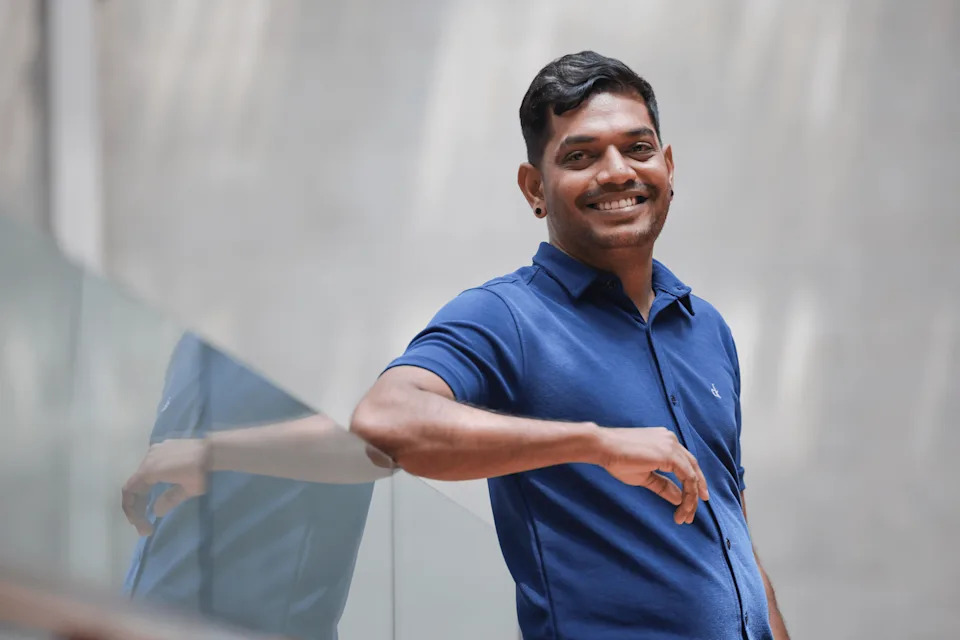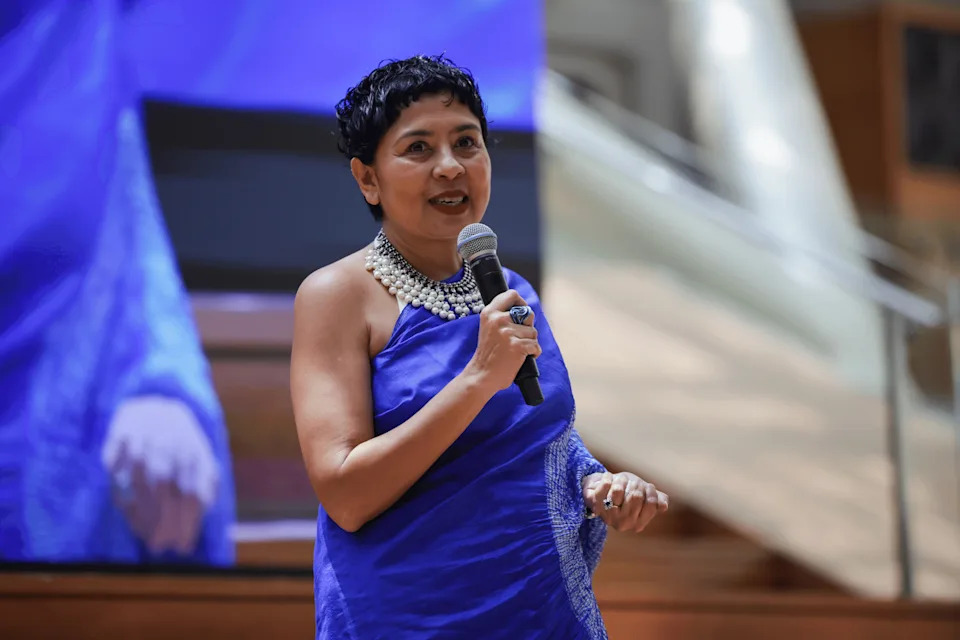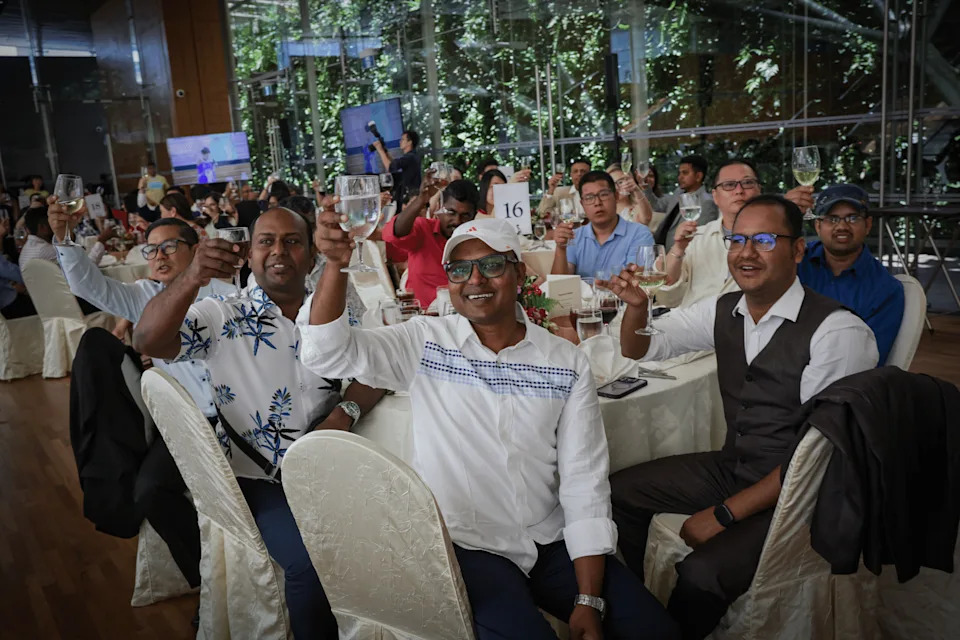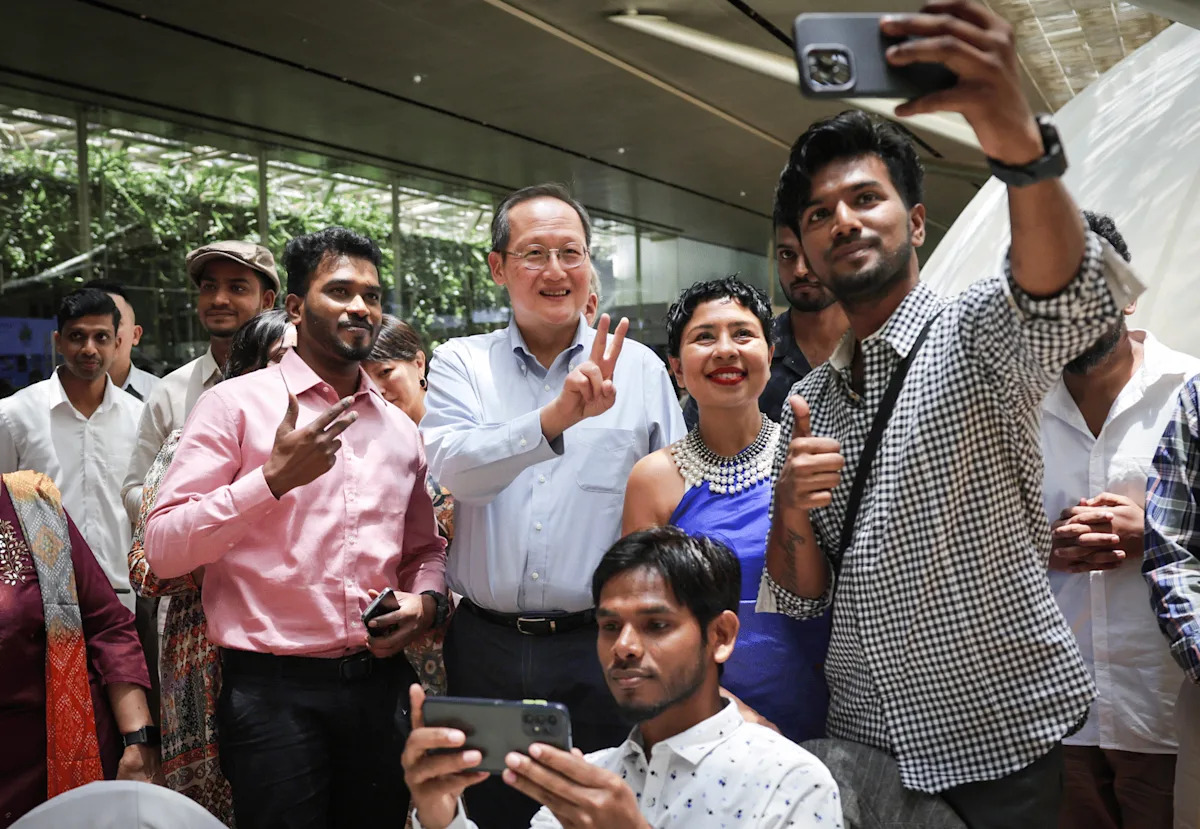SINGAPORE – Migrant workers who need help urgently, such as after an accident or health emergency, can now tap a new fund meant to provide immediate financial relief.
The Health, Emergency, Aid, Relief and Treatment (Heart) Fund was launched by ItsRainingRaincoats (IRR) on Sept 21 during a luncheon celebrating the charity’s 10th anniversary.
Speaking to the media on the sidelines of the event at National Gallery Singapore, IRR founder Dipa Swaminathan said the fund will help volunteers respond decisively when help is required immediately. Traditionally, fund raising has been done on a case-specific basis, which can often take weeks.
“Before this fund was in place, every time we have a case, we would have to float a new funding appeal,” said Ms Dipa, adding that this is contingent on whether the worker involved agrees to have the facts of the case publicly known.
“Without doing that, it’s very hard to raise funds. So we thought that we would have a rainy day fund, something that will enable us to help these men when life is at its worst for them.”
The fund received a boost during the luncheon, which was attended by more than 200 people, including donors, IRR partners, volunteers and migrant workers. Around $120,000 was raised during the event, which featured a runway show and live auction of items and experiences sponsored by IRR’s partners.
The money will go towards the Heart Fund and the daily operations of IRR.
There is no fixed amount that IRR aims to raise for the fund, said Ms Dipa, adding that the organisation can use up a sizeable amount quickly in cases such as where a worker needs treatment for cancer.
The division of funds among workers will also depend on the cases they receive, but the charity will try its best to be fair and provide help where it is most needed, said Ms Dipa.
The experience of 36-year-old driver Kasirajan Ravi is an example of what IRR hopes to use the Heart Fund for. After 13 years as a manufacturing worker in Singapore, his employment was terminated by his employer in 2021.
Recounting his story to The Straits Times, Mr Kasirajan said he contacted an IRR volunteer for help on the day of his departure from Singapore. The organisation worked quickly with the authorities to get him a special permit, which allowed him to stay for an extra month for investigations to be completed.
After he returned to India, IRR provided him with about $1,500 to help defray his daily and household expenses.
“IRR also helped me with a work pass after I was rejected a few times,” said Mr Kasirajan, adding that the charity also put him in contact with potential employers in Singapore, which led to his eventual return in 2023.

Driver Kasirajan Ravi is one of the migrant workers who was helped by ItsRainingRaincoats.
The charity, founded by Ms Dipa in 2015, is known for its work to improve the welfare of the migrant worker community. Earlier in 2025, it crowdfunded $72,000 in two days as a reward for the workers that saved a driver who fell into a sinkhole in Tanjong Katong.
Over the last 10 years, the charity has distributed over 1.1 million meals and 650,000 essential items, as well as taken more than 48,000 workers on excursions across Singapore, said IRR in a statement on Sept 21. More than 1,600 workers have also been provided with language classes, dental appointments and eye care.
The charity also launched a store in Bukit Merah, where workers can pick up clothes, toiletries, bags, snacks and electronics for free.
The Heart Fund is among a few long-term, ground-up initiatives to help migrant workers. In December 2024, the CritiCare Fund for Migrant Workers was launched by social entrepreneur Anthea Ong and Mr Vincent Ng, founding member of a non-profit cooperative, to close the financing gaps for workers who fall ill here, in the event that their insurance payouts are insufficient to cover actual treatment costs.
Looking back on the journey so far, Ms Dipa said public awareness of workers’ living conditions has improved and the willingness to help has increased.
“Back when I started, it was not a very glamorous cause and not many people were involved in this space,” she said.
“We’ve come a long way in building these bridges of engagement between residents and workers, and I think that has played a part in making our society more inclusive.”

ItsRainingRaincoats founder Dipa Swaminathan speaking at the charity’s 10th anniversary event on Sept 21.
But the charity has also experienced tough times – chief among them being the burnout and fatigue volunteers face.
“We see the hardships workers face and they become our problems,” said Ms Dipa, adding that constantly reaching out to partners and donors for help adds to the stress.
“I’m unpaid and all the volunteers are unpaid. I can just close shop, sit in the library and read a book. But the fact is, we feel that we owe these guys a debt of compassion. They have done so much for us, we have to do something back for them, and that’s what drives us.”
Though there is no fixed blueprint for the next decade, the lawyer hopes to bring in new blood for the charity, which has three full-time staff and more than 1,500 volunteers, and cultivate a wider cultural acceptance of workers.
She added: “You don’t have to volunteer with IRR or another organisation to help migrant workers – if you see them in a traffic jam in a lorry, give way to them. If they are working near your house, give them some cold drinks.
“I hope these kinds of simple acts will become the norm.”

Migrant workers and attendees cheering at ItsRainingRaincoats’s 10th anniversary on Sept 21.
Speaking at the luncheon, Manpower Minister Tan See Leng referred to himself and everyone in the audience as a “raincoat” that can help the migrant worker community.
“What is actually important is that the Government, in working with IRR and many other non-governmental organisations that are here today, constantly calibrates, tweaks, refines and improves what we can do,” said Dr Tan.
He added that the migrant worker space has undergone significant transformation, such that migrant workers now attend a one-day programme in which they learn about their employment rights and responsibilities and Singapore’s social norms, for instance.
“We socialise with them, and we nudge them constantly to also look at their own rights. We take care of their healthcare, their mental wellness, the physical well-being, and the entire primary care network has been transformed into the way (in which) we are able to do that outreach.”
Source: The Straits Times © SPH Media Limited. Permission required for reproduction
Discover how to enjoy other premium articles here
